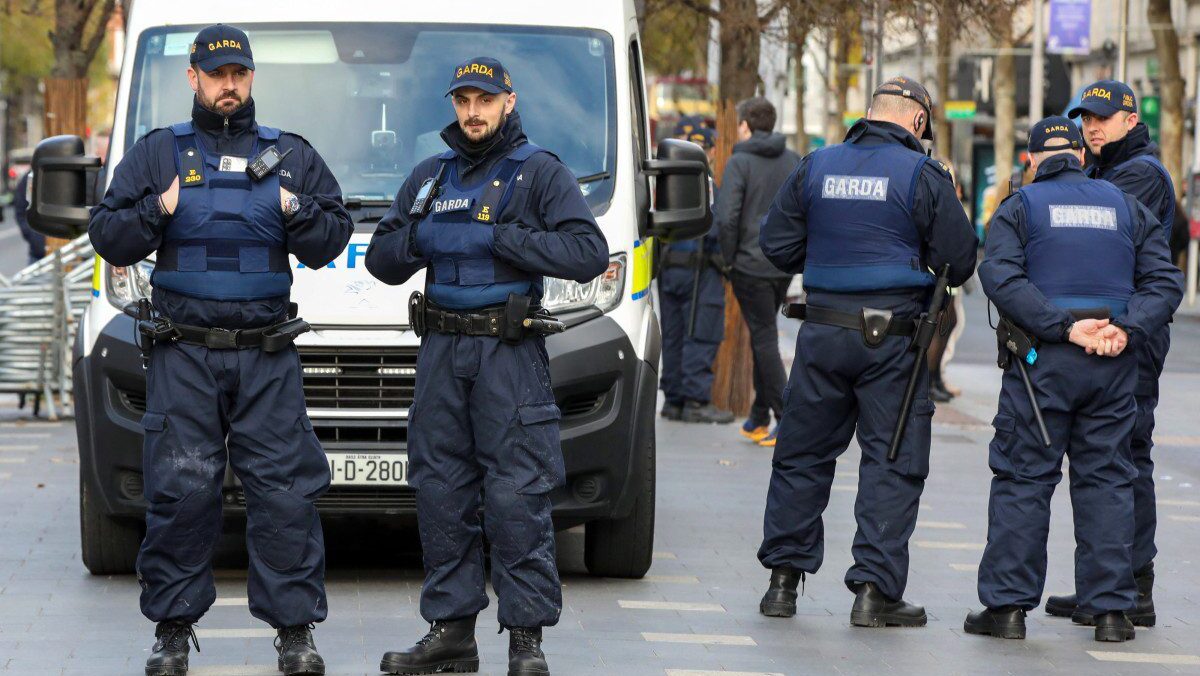
Irish Garda police officers stand on duty outside the General Post Office (GPO) in O’Connell street, in Dublin on November 24, 2023, following a night of violent protests.
Photo: PAUL FAITH / AFP
Irish police made 34 arrests on Friday, November 24th, after a night of rioting the country has not experienced in years. Irish Prime Minister Leo Varadkar said those involved should be ashamed of themselves. Conservative commentators, however, believe mainstream parties have slyly shifted their rhetoric away from the real problem: the violent knife attack on small children in Dublin that preceded the riots on Thursday, and the ever-increasing number of asylum seekers in the Republic.
BREAKING: At least three children have been injured in what is described as a suspected stabbing incident near a school in central Dublin. Gardai are releasing no further information at present. pic.twitter.com/RGYXUg9PI5
— gript (@griptmedia) November 23, 2023
As our colleague in Dublin reported on Thursday, a knife-wielding man attacked schoolchildren as they were leaving a school in the Irish capital. A total of three children, their teacher, and the attacker were subsequently rushed to hospital after the frenzied assault was only stopped by a Brazilian fast food delivery driver, who used his helmet to beat the assailant to the ground.
A five-year-old girl remains in a critical condition, Reuters reports. The female teacher in her 30s is also in a serious condition. The two other children, a five-year-old boy and a six-year-old girl, suffered less serious injuries.
The attacker has been described by some media sources as an Algerian national, others speak of “a naturalized Irish citizen, who has lived here for 20 years.” Police have not commented on the nationality of the man—in his 40s or 50s—who is also being treated for serious injuries. Police have not ruled out any motive, including whether it could be terrorism-related.
They have, however, along with the mainstream parties, blamed the ‘far-right’ for the riots that followed the attack.
Multiple police squad cars, a double-decker bus, and parts of the Dublin tram system were set ablaze with additional reports of arson attacks surfacing. An asylum centre in the suburbs also went up in smoke. Thirteen shops were damaged or looted. One officer was seriously injured. Police said there would be a very heavy police presence on Friday, in anticipation of further rioting.
Multiple vehicles on fire amid clashes with riot police in Dublin. pic.twitter.com/nw7sWdHLhJ
— gript (@griptmedia) November 23, 2023
“Those involved brought shame on Dublin, brought shame on Ireland and brought shame on their families and themselves. … As a country we need to reclaim Ireland. We need to take it away from the cowerers who hide behind masks and try to terrify us with their violence,” Prime Minister Leo Varadkar told a news conference on Friday.
“We will be relentless in protecting our citizens and defending our people.”
— Fine Gael (@FineGael) November 24, 2023
—Taoiseach @LeoVaradkar pic.twitter.com/fbkdIJ9JbM
Irish Justice Minister Helen McEntee said, “We will not tolerate a small number using an appalling incident to spread division.”
The number of newly registered asylum seekers in Ireland last year was 13,651, a significant increase over recent years. The trend upwards has continued this year, with 1,481 asylum applications received in October, a 25% increase over October of last year. The main countries of origin are Nigeria, Algeria, Afghanistan, Georgia, and Somalia (the figures do not include Ukrainian refugees). In a recent survey, 75% of those polled said Ireland is taking in too many refugees.
A commentary on the news website Gript points out that “the media, like the government and the opposition, were eager to change the conversation, and Dublin city centre being set on fire gave them perfect cover to do so.” Though small children being subjected to a random, frenzied, knife attack had never happened before, the “focus had shifted, away from the stabbed children and onto the riots that followed.”
Meanwhile, Leo Varadkar said new laws would be passed in the coming weeks to enable police to make better use of CCTV evidence, and Ireland would also ‘modernise’ laws regarding hate and incitement. A hate speech law, which has already been in the works for some time, and is being discussed by the Irish Parliament, has been harshly criticised for its loose definition of ‘hatred’. The law would make it a criminal offence to possess allegedly “hateful material” on one’s person or in one’s home. Possession of hateful material will carry a penalty of up to five years in prison.
Paul Coleman, a British lawyer and executive director of the legal advocacy organisation ADF International (Alliance Defending Freedom) recently told The European Conservative in an interview that the Irish hate speech law “is probably the worst in Europe that I have seen so far.”
